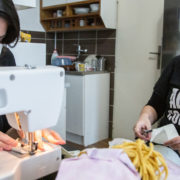“They said the face masks were desperately needed, and I did not hesitate, says Klara Pulova, from Tanvald, a small town in the north of the country. I have been a sewing professional in the past, I know the job.”
However, it soon became clear that there were not enough masks for essential workers, such as health professionals, the police, and the fire brigade. Within 24 hours, a grassroots initiative, the “face mask movement”, sprang up, with people dusting off old sewing machines and putting them to use, spurred on by social media groups and websites.
In Tanvald, Ms. Pulova’s former colleagues provided her with a sewing machine, and friends and other people provided the material: although non-essential shops had been ordered to close as part of the government shutdown, an exception was soon made for stores selling materials needed for textile face masks.
The Roma community is not the only Czech minority group taking up the challenge. Refugees, migrants and minorities have also been mobilizing to help out. For example, the Vietnamese community set up an account that its members could contribute to, which is being used to fund the production of single-use protective masks, that are being delivered to hospitals and care homes for the elderly.




